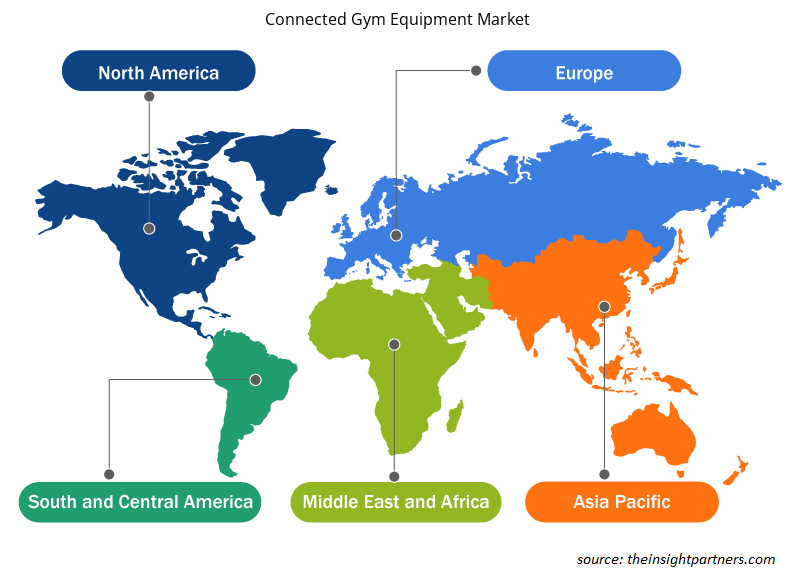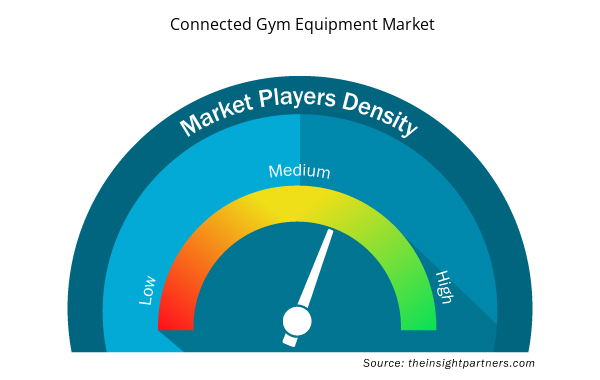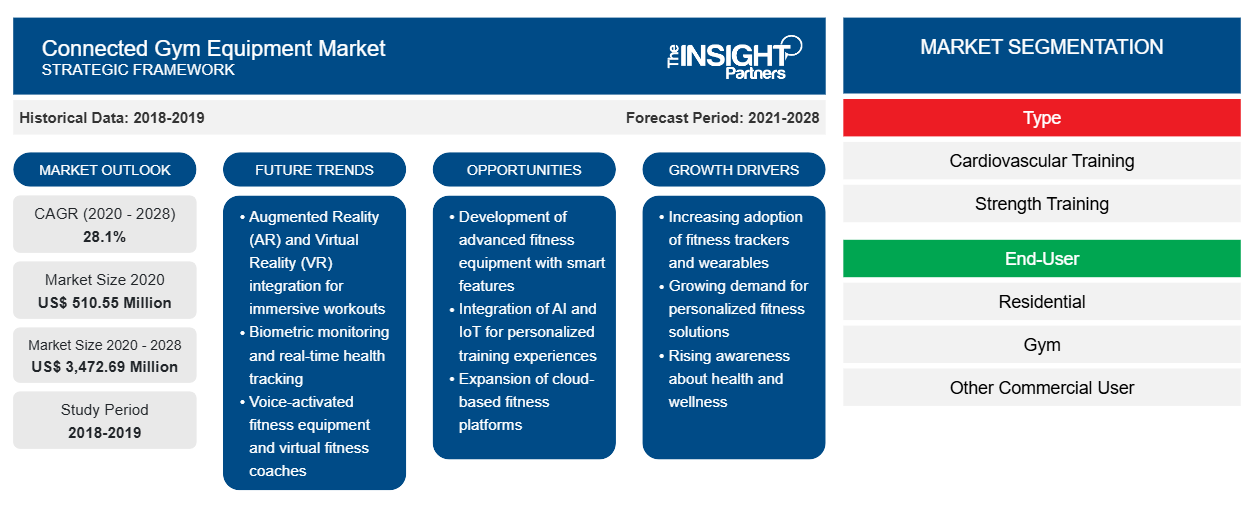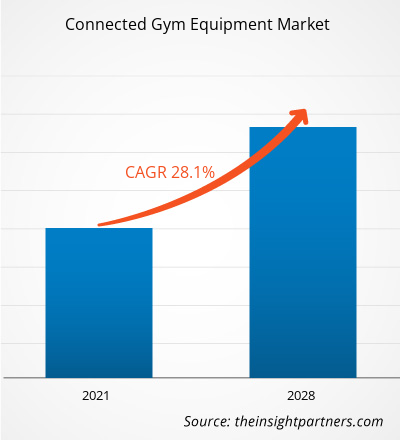Nel 2020, il mercato delle attrezzature da palestra connesse era valutato 510,55 milioni di dollari USA e si prevede che raggiungerà i 3.472,69 milioni di dollari USA entro il 2028; si prevede una crescita a un CAGR del 28,1% dal 2021 al 2028.
L'aumento della consapevolezza di fitness e salute sta aumentando la domanda di attrezzature da palestra connesse. Le attrezzature da palestra connesse stanno guadagnando popolarità in quanto raccolgono e archiviano dati sul server, accessibile da qualsiasi luogo. I centri fitness stanno adottando le ultime tecnologie per attrarre nuovi clienti, il che sta aumentando la domanda di attrezzature da palestra connesse. Tuttavia, i piccoli centri fitness non sono in grado di aggiornare il loro sistema a causa del suo costo elevato, che è il fattore chiave che ostacola la crescita del mercato delle attrezzature da palestra connesse.
Personalizza questo report in base alle tue esigenze
Riceverai la personalizzazione gratuita di qualsiasi report, comprese parti di questo report, o analisi a livello nazionale, pacchetto dati Excel, oltre a usufruire di grandi offerte e sconti per start-up e università
- Scopri le principali tendenze di mercato in questo rapporto.Questo campione GRATUITO includerà analisi di dati che spaziano dalle tendenze di mercato alle stime e alle previsioni.
Impatto della pandemia di COVID-19 sul mercato delle attrezzature da palestra connesse
Secondo gli ultimi rapporti, Stati Uniti, India, Brasile, Francia, Turchia, Russia, Regno Unito, Italia, Spagna e Germania sono tra i paesi più colpiti dalla pandemia di COVID-19. La pandemia di COVID-19 ha colpito il settore industriale in tutto il mondo. L'economia globale ha subito il colpo peggiore nel 2020 e potrebbe continuare anche nel 2021. Questa situazione ha creato notevoli perturbazioni nel business di palestre, centri fitness e salute, piscine e hotel. Un grave calo del tasso di crescita delle attività menzionate sta influenzando la crescita del mercato globale delle attrezzature da palestra connesse, poiché utilizzano questi prodotti in misura maggiore.
Poiché le palestre sono classificate come servizi non essenziali, i governi hanno imposto loro serie restrizioni e stanno affrontando seri problemi da quasi un anno a questa parte. L'uso di attrezzature da palestra connesse per l'allenamento cardiovascolare e l'allenamento della forza ha subito un forte calo. I divieti di viaggio, le chiusure delle fabbriche, i blocchi delle frontiere e le restrizioni all'importazione ed esportazione per combattere lo scoppio del COVID-19 hanno avuto un impatto sulla fornitura, la produzione e la vendita di varie materie prime necessarie per la fabbricazione di attrezzature da palestra. Tuttavia, poiché le persone non possono andare in palestra, alcune di loro preferiscono acquistare attrezzature da palestra connesse residenziali per continuare la loro routine di allenamento.
Approfondimenti sul mercato delle attrezzature da palestra connesse
Crescente domanda di attrezzature per palestre connesse residenziali
Le persone hanno orari diversi in base alla loro professione. Gli orari generali in palestre e centri benessere potrebbero non essere adatti a tutti i clienti. Inoltre, gli orari dell'utente e dell'allenatore dovrebbero coincidere per la sessione di allenamento. C'è una grande opportunità nella progettazione e produzione di attrezzature da palestra connesse a prezzi accessibili per uso residenziale, poiché gli utenti sono inclini alla privacy e alla praticità. La domanda di attrezzature per il fitness intelligenti è in aumento sia nei paesi sviluppati che in quelli in via di sviluppo. Questi includono principalmente paesi del Nord America, Europa e Asia-Pacifico. Inoltre, il reddito familiare disponibile sta aumentando notevolmente in molti paesi in via di sviluppo.
Considerando la capacità di acquisto e lo spazio disponibile in casa, i produttori hanno anche l'opportunità di personalizzare attrezzature e macchinari intelligenti, il che aumenterà significativamente la domanda di attrezzature da palestra connesse nel segmento di prezzo medio.
Approfondimenti di mercato basati sul tipo
In base al tipo, il mercato delle attrezzature da palestra connesse è segmentato inallenamento cardiovascolare, allenamento della forza e altri. Il segmento dell'allenamento cardiovascolare ha dominato il mercato. L'attrezzatura per la palestra cardio contiene vari programmi, caratteristiche e impostazioni che spesso non vengono utilizzate in modo efficace. Le macchine connesse aiutano gli utenti a ottenere i vantaggi di vari programmi di allenamento cardio che possono essere personalizzati in base alle esigenze di un individuo.
Approfondimenti di mercato basati sull'utente finale
In base all'utente finale, il mercato delle attrezzature da palestra connesse è segmentato in residenziale, palestra e altri utenti commerciali. Il segmento palestra continua a detenere una quota significativa nel mercato, grazie alla crescente consapevolezza della salute e alla crescente digitalizzazione delle attrezzature da palestra. Inoltre, ci sono alcuni esercizi che possono essere eseguiti meglio in palestra che a casa.
Gli operatori che operano nel mercato delle attrezzature da palestra connesse si concentrano su strategie quali fusioni, acquisizioni e iniziative di mercato per mantenere le loro posizioni nel mercato. Di seguito sono elencati alcuni sviluppi da parte degli operatori chiave:
Nel 2021, Peloton ha annunciato di aver ufficialmente concluso l'acquisizione di Precor, uno dei maggiori fornitori globali di attrezzature per il fitness commerciale con una significativa presenza manifatturiera negli Stati Uniti. Con questa acquisizione, Peloton stabilisce la sua capacità produttiva negli Stati Uniti e prevede di potenziare le capacità di ricerca e sviluppo con il team altamente qualificato di Precor e di accelerare la penetrazione di Peloton nel mercato commerciale.
Nel 2020, Matrix Fitness, uno dei marchi di fitness commerciale in più rapida crescita al mondo, ha cambiato il modo in cui il settore del fitness pensa ai tapis roulant a nastro a doghe introducendo il suo Performance Plus Treadmill progettato con cura. Il tapis roulant rivisitato offre un'esperienza di corsa eccezionale attraverso prestazioni ineguagliabili per le strutture che desiderano differenziare la propria offerta con un prodotto che duri più a lungo dei design tradizionali. I proprietari e i gestori di strutture fitness potranno dare un'occhiata in anteprima al Performance Plus Treadmill alle fiere di settore IHRSA e FIBO del 2020.
Approfondimenti regionali sul mercato delle attrezzature da palestra connesse
Le tendenze regionali e i fattori che influenzano il mercato delle attrezzature da palestra connesse durante il periodo di previsione sono stati ampiamente spiegati dagli analisti di Insight Partners. Questa sezione discute anche i segmenti e la geografia del mercato delle attrezzature da palestra connesse in Nord America, Europa, Asia Pacifico, Medio Oriente e Africa e America centrale e meridionale.

- Ottieni i dati specifici regionali per il mercato delle attrezzature da palestra connesse
Ambito del rapporto di mercato sulle attrezzature da palestra connesse
| Attributo del report | Dettagli |
|---|---|
| Dimensioni del mercato nel 2020 | 510,55 milioni di dollari USA |
| Dimensioni del mercato entro il 2028 | 3.472,69 milioni di dollari USA |
| CAGR globale (2020 - 2028) | 28,1% |
| Dati storici | 2018-2019 |
| Periodo di previsione | 2021-2028 |
| Segmenti coperti | Per tipo
|
| Regioni e Paesi coperti | America del Nord
|
| Leader di mercato e profili aziendali chiave |
|
Densità dei player del mercato delle attrezzature da palestra connesse: comprendere il suo impatto sulle dinamiche aziendali
Il mercato delle attrezzature da palestra connesse sta crescendo rapidamente, spinto dalla crescente domanda degli utenti finali dovuta a fattori quali l'evoluzione delle preferenze dei consumatori, i progressi tecnologici e una maggiore consapevolezza dei vantaggi del prodotto. Con l'aumento della domanda, le aziende stanno ampliando le loro offerte, innovando per soddisfare le esigenze dei consumatori e capitalizzando sulle tendenze emergenti, il che alimenta ulteriormente la crescita del mercato.
La densità degli operatori di mercato si riferisce alla distribuzione di aziende o società che operano in un particolare mercato o settore. Indica quanti concorrenti (operatori di mercato) sono presenti in un dato spazio di mercato in relazione alle sue dimensioni o al valore di mercato totale.
Le principali aziende che operano nel mercato delle attrezzature da palestra connesse sono:
- PALESTRA
- Fitness per la vita
- LES MILLS INTERNATIONAL LTD
- Technogym SpA
- Precor Incorporato
Disclaimer : le aziende elencate sopra non sono classificate secondo un ordine particolare.

- Ottieni una panoramica dei principali attori del mercato delle attrezzature da palestra connesse
Per tipo
- Allenamento cardiovascolare
- Allenamento della forza
- Altri
Per utente finale
- Residenziale
- Palestra
- Altro utente commerciale
Per Geografia
- America del Nord
- NOI
- Canada
- Messico
- Europa
- Francia
- Germania
- Italia
- Regno Unito
- Russia
- Resto d'Europa
- Asia Pacifico (APAC)
- Cina
- India
- Corea del Sud
- Giappone
- Australia
- Resto dell'APAC
- Medio Oriente e Africa (MEA)
- Sudafrica
- Arabia Saudita
- Emirati Arabi Uniti
- Resto del MEA
- America del Sud (SAM)
- Brasile
- Argentina
- Resto del SAM
Profili aziendali
- PALESTRA
- Fitness per la vita
- LES MILLS INTERNATIONAL LTD
- Technogym SpA
- Precor Incorporato
- Cybex International, Inc.
- Tecnologia sanitaria Johnson
- Società a responsabilità limitata
- Nautilus, Inc.
- Tecnologia di fitness vera, Inc.
- Analisi storica (2 anni), anno base, previsione (7 anni) con CAGR
- Analisi PEST e SWOT
- Valore/volume delle dimensioni del mercato - Globale, regionale, nazionale
- Industria e panorama competitivo
- Set di dati Excel


- Toothpaste Market
- Occupational Health Market
- Joint Pain Injection Market
- Dealer Management System Market
- Integrated Platform Management System Market
- Vision Guided Robotics Software Market
- Radiopharmaceuticals Market
- Railway Braking System Market
- Emergency Department Information System (EDIS) Market
- Clinical Trial Supplies Market

Report Coverage
Revenue forecast, Company Analysis, Industry landscape, Growth factors, and Trends

Segment Covered
This text is related
to segments covered.

Regional Scope
North America, Europe, Asia Pacific, Middle East & Africa, South & Central America

Country Scope
This text is related
to country scope.
Domande frequenti
Considering not only the pandemic of COVID-19, otherwise also, people have got different timing schedules according to their professions. General timings in gyms and health club may not be suitable for very customer. Also, the user’s timing and trainer’s timing should match for the workout session. There lies a great opportunity in designing and manufacturing affordable connected gym equipment for residential use as users are inclining towards privacy and convenience. Demand for smart fitness equipment is increasing developed as well as developing countries. These majorly includes countries from North America, Europe, and Asia-Pacific region. Also, disposable house-hold incoming is increasing noticeably in many developing countries.
Physical conditioning that exercises the lungs, heart, and blood vessels is involved in Cardiovascular Training. Users utilize a broad range of connected cardiovascular equipment, such as elliptical, treadmills, upright bikes, arm bikes, alternative motion machines and rowing machines. They utilize this equipment for improving health of their heart, lowering blood pressure, and losing body weight. Expenditure on various types of gym equipment is expected to rise considering increasing concerns about cardiovascular disorders in youngsters all over the world because of fluctuating climate conditions and busy work life.
Earlier, people didn’t have to take out dedicated time for exercise. Their daily routine was enough to burn those extra calories. Barring few jobs like product delivery, nursing, surgery, and some farming activities, almost all jobs in today’s time are moving towards sedentary work style. This is happening because automation is taking place in almost every walk of life. These all has given rise to insufficient physical activity among individuals. Insufficient physical activity in daily life is considered as one of the major risk factors for death all over the world. Inadequate physical activity is a crucial risk factor involved with non-communicable diseases (NCDs) like cancer, diabetes, and cardiovascular diseases. It also invites unwanted obesity in many people at very young age.
Trends and growth analysis reports related to Electronics and Semiconductor : READ MORE..
The List of Companies - Connected Gym Equipment Market
- EGYM
- Life Fitness
- LES MILLS INTERNATIONAL LTD
- Technogym S.p.A
- Precor Incorporated
- Cybex International, Inc.
- Johnson Health Tech
- Draper, Inc.
- Nautilus, Inc.
- TRUE Fitness Technology, Inc.
The Insight Partners performs research in 4 major stages: Data Collection & Secondary Research, Primary Research, Data Analysis and Data Triangulation & Final Review.
- Data Collection and Secondary Research:
As a market research and consulting firm operating from a decade, we have published and advised several client across the globe. First step for any study will start with an assessment of currently available data and insights from existing reports. Further, historical and current market information is collected from Investor Presentations, Annual Reports, SEC Filings, etc., and other information related to company’s performance and market positioning are gathered from Paid Databases (Factiva, Hoovers, and Reuters) and various other publications available in public domain.
Several associations trade associates, technical forums, institutes, societies and organization are accessed to gain technical as well as market related insights through their publications such as research papers, blogs and press releases related to the studies are referred to get cues about the market. Further, white papers, journals, magazines, and other news articles published in last 3 years are scrutinized and analyzed to understand the current market trends.
- Primary Research:
The primarily interview analysis comprise of data obtained from industry participants interview and answers to survey questions gathered by in-house primary team.
For primary research, interviews are conducted with industry experts/CEOs/Marketing Managers/VPs/Subject Matter Experts from both demand and supply side to get a 360-degree view of the market. The primary team conducts several interviews based on the complexity of the markets to understand the various market trends and dynamics which makes research more credible and precise.
A typical research interview fulfils the following functions:
- Provides first-hand information on the market size, market trends, growth trends, competitive landscape, and outlook
- Validates and strengthens in-house secondary research findings
- Develops the analysis team’s expertise and market understanding
Primary research involves email interactions and telephone interviews for each market, category, segment, and sub-segment across geographies. The participants who typically take part in such a process include, but are not limited to:
- Industry participants: VPs, business development managers, market intelligence managers and national sales managers
- Outside experts: Valuation experts, research analysts and key opinion leaders specializing in the electronics and semiconductor industry.
Below is the breakup of our primary respondents by company, designation, and region:

Once we receive the confirmation from primary research sources or primary respondents, we finalize the base year market estimation and forecast the data as per the macroeconomic and microeconomic factors assessed during data collection.
- Data Analysis:
Once data is validated through both secondary as well as primary respondents, we finalize the market estimations by hypothesis formulation and factor analysis at regional and country level.
- Macro-Economic Factor Analysis:
We analyse macroeconomic indicators such the gross domestic product (GDP), increase in the demand for goods and services across industries, technological advancement, regional economic growth, governmental policies, the influence of COVID-19, PEST analysis, and other aspects. This analysis aids in setting benchmarks for various nations/regions and approximating market splits. Additionally, the general trend of the aforementioned components aid in determining the market's development possibilities.
- Country Level Data:
Various factors that are especially aligned to the country are taken into account to determine the market size for a certain area and country, including the presence of vendors, such as headquarters and offices, the country's GDP, demand patterns, and industry growth. To comprehend the market dynamics for the nation, a number of growth variables, inhibitors, application areas, and current market trends are researched. The aforementioned elements aid in determining the country's overall market's growth potential.
- Company Profile:
The “Table of Contents” is formulated by listing and analyzing more than 25 - 30 companies operating in the market ecosystem across geographies. However, we profile only 10 companies as a standard practice in our syndicate reports. These 10 companies comprise leading, emerging, and regional players. Nonetheless, our analysis is not restricted to the 10 listed companies, we also analyze other companies present in the market to develop a holistic view and understand the prevailing trends. The “Company Profiles” section in the report covers key facts, business description, products & services, financial information, SWOT analysis, and key developments. The financial information presented is extracted from the annual reports and official documents of the publicly listed companies. Upon collecting the information for the sections of respective companies, we verify them via various primary sources and then compile the data in respective company profiles. The company level information helps us in deriving the base number as well as in forecasting the market size.
- Developing Base Number:
Aggregation of sales statistics (2020-2022) and macro-economic factor, and other secondary and primary research insights are utilized to arrive at base number and related market shares for 2022. The data gaps are identified in this step and relevant market data is analyzed, collected from paid primary interviews or databases. On finalizing the base year market size, forecasts are developed on the basis of macro-economic, industry and market growth factors and company level analysis.
- Data Triangulation and Final Review:
The market findings and base year market size calculations are validated from supply as well as demand side. Demand side validations are based on macro-economic factor analysis and benchmarks for respective regions and countries. In case of supply side validations, revenues of major companies are estimated (in case not available) based on industry benchmark, approximate number of employees, product portfolio, and primary interviews revenues are gathered. Further revenue from target product/service segment is assessed to avoid overshooting of market statistics. In case of heavy deviations between supply and demand side values, all thes steps are repeated to achieve synchronization.
We follow an iterative model, wherein we share our research findings with Subject Matter Experts (SME’s) and Key Opinion Leaders (KOLs) until consensus view of the market is not formulated – this model negates any drastic deviation in the opinions of experts. Only validated and universally acceptable research findings are quoted in our reports.
We have important check points that we use to validate our research findings – which we call – data triangulation, where we validate the information, we generate from secondary sources with primary interviews and then we re-validate with our internal data bases and Subject matter experts. This comprehensive model enables us to deliver high quality, reliable data in shortest possible time.


 Ottieni un campione gratuito per questo repot
Ottieni un campione gratuito per questo repot